Coronavirus: How are England’s coastal resorts faring?
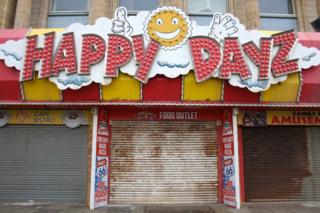
In the 1950s, English coastal resorts throbbed with holidaymakers. Nowadays, seaside towns are more commonly associated with decay and poverty than popularity and prosperity.
Will the effects of the coronavirus lockdown tip these places into a terminal decline – or is there optimism that the government’s aim of a further easing of lockdown rules next month might save the vital summer season?
BBC News went to three seaside towns to find out.
Great Yarmouth
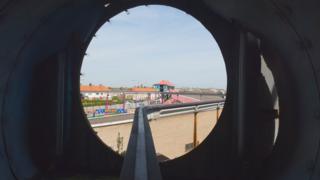
Albert Jones is waiting for a special delivery – nearly three months behind schedule.
A £550,000 ride, custom-built for Great Yarmouth Pleasure Beach, was set to be this year’s star attraction, but instead of arriving in mid-March, travel restrictions meant it was left stranded in Italy.
«When that first truck pulls in here, it’ll be a sigh of relief for everybody,» he says on the morning of its arrival.
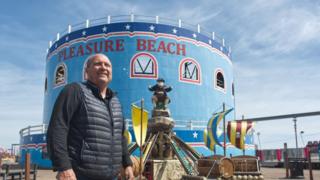
The Norfolk town’s Pleasure Beach has been in his family since the 1950s, but the pandemic has brought logistical problems never faced before.
This year he has lost more than 50 opening days and furloughed all but two of 30 full-time staff.
Between 5,000 and 6,000 people normally enter the attraction on a busy summer’s day.
In a time of social distancing, he plans to restrict that number initially to 1,000 in two three-hour blocks and he is encouraging people to book online so cash need not be exchanged at the gate.
Rides will have to be carefully managed for visitors, he says, adding: «They can’t all jump out at the end.»

He says government support, including the furlough scheme, has been a «lifeline», but adds the tourism industry may need more support if a July opening is not forthcoming.
«If we get open by 11 July and get the six weeks’ holiday then it’s not going to be a total disaster.»
More than a third of Yarmouth’s employment is tourism-related – about 12,000 jobs – and the industry is estimated to generate £635m for the local economy each year.
«Our entire community is built on leisure,» says Jack Jay, ringmaster at the Hippodrome Circus – one of only two surviving circus buildings in England.
In the Jay family for the past four decades, the circus is on a run of three consecutive record-breaking years and had added four weeks to its programme because of its success.

Jack’s brother Ben says they had been getting visitors in their 20s and 30s from London «who have never been to Yarmouth before – they’re blown away by it».
«Yarmouth was on a roll, Yarmouth was on the up, with the ‘staycation’ and the short break it was getting bigger and bigger,» Ben says.
But the coronavirus outbreak caused the cancellation of the circus’s Easter schedule, when acts from as far away as Australia, Argentina and Canada had been due to perform.
When it does reopen, social distancing will reduce capacity inside the venue by about two-thirds.
Jack says he is aware that people will need to feel confidence entering an indoor entertainment area after an extended period in lockdown.
«That first time that somebody spends a prolonged period of time in an enclosed space is going to be daunting,» he says.

One of the members of the local tourism board, Asa Morrison, says the town «desperately wants to be in a situation where we can welcome visitors back».
«It’s just getting the timing right and making sure all the systems are in place – and everybody is ultimately responsible; the visitors, the businesses, the residents, everybody.»
He says the area relies heavily on the money made during the summer months, and if there were to be a second coronavirus peak «it would be catastrophic».
«Obviously we’re watching a virus which is affecting everybody across the globe in a significant way and, from our perspective, not only is it a risk to life but a risk to livelihood as well.»
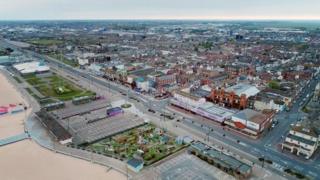
Blackpool
Even on an overcast weekday in June, there would normally be countless day-trippers braving the brisk sea air on Blackpool promenade. But on this particular day, it is deserted and the shutters are down on almost every rock shop and chippie from North Pier to South Shore.
This is a town that for nine months of the year lives or dies by the tourist trade. Its season starts around Easter and culminates in November with the illuminations. This year, lockdown coincided with the moment many businesses were reopening.
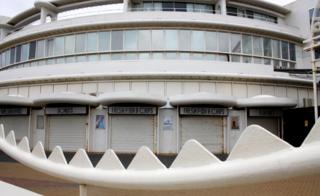
«It’s been financially devastating, it couldn’t have happened at a worse time,» says B&B owner Claire Smith. «Even though we tick over in the winter, Easter is our first big financial boost.
«We have a little advantage over some resorts because we do have that extended season. We used to say the illuminations were the icing on the cake… now they will be critical.»
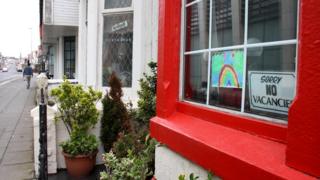
Blackpool has long struggled with poverty and is frequently near the top of the list as one of the most deprived areas of England. But since Victorian times it has been popular with tourists, and still welcomed more than 18 million in 2018.
Claire, who runs two properties and is president of B&B and guesthouse association StayBlackpool, says reopening on 4 July will be crucial for businesses.
«That’s the date on everyone’s mind, that we must be open. And if we do, [the season] will be rescuable. But we need the complete package – you don’t come just to stay in a B&B, you come to go to the Pleasure Beach and see a show and dance at the Tower Ballroom.»
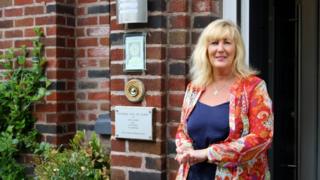
She says the concern is whether tourists will return at all this year.
«People aren’t booking with confidence yet; we’ve got the odd one in October – it’s nothing like we would normally have had – and with the weather we’ve had, we probably would have had the best two months for a number of years.
«To see the beach and the sea and the prom looking so gorgeous, then you look the other way and nothing’s open – it’s heartbreaking.»
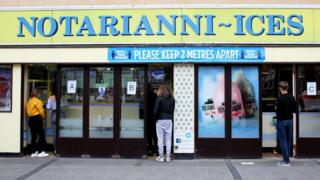
Fourth-generation ice cream parlour Notarianni reopened for the summer season on 7 March – 15 days later it was shut again. Never in its 92 years on Waterloo Road has it closed mid-season, says manager Luca Vettese.
«[The loss] has been astronomical, frightening – about £150,000. Our busiest [time] is around Easter and May with all the bank holidays – we’ve missed all that. This year is about survival; all the goals and targets aren’t reachable now. There has been help, but nothing compared to what we’ve missed out on.»
To soften the financial blow, the family set up a temporary delivery service, making 100 drops a day across the Fylde coast. Luca says he has since spent a «fortune» on PPE and social distancing measures to reopen the takeaway counter.
«People are used to queuing close together and we can’t do that any more. But we’re fortunate we’ve got loyal customers and as soon as we’ve opened, they’ve come back. We’re an abnormal business in Blackpool as we’re 80-90% local trade. The rest of Blackpool relies on tourists.»
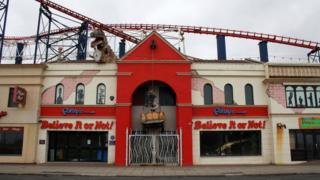
The Grand Theatre relies on both. In a normal year, it sells 130,000 tickets to holidaymakers and local theatregoers, but over the past three months it has refunded or moved 50,000 bookings, losing £250,000.
«It’s a huge chunk,» says chief executive Ruth Eastwood. «Some have taken a refund, some have taken a credit and it’s wonderful people have left that money with us and want to come back, but it delays the pain.
«Financially it’s not just about the summer season, it’s about cash flow. We have got a healthy business but on 17 March our income just stopped – 91% comes from ticket sales.»
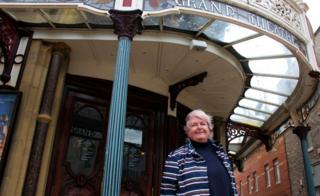
Government help has allowed the charity to furlough 50 staff and launch a digital channel offering shows and workshops. But if it does not get emergency funding from the Arts Council later this month, it will become insolvent.
Ruth is, however, hopeful and has rescheduled shows at the Grade II*-listed building from September and into 2022. She points out the 126-year-old theatre has survived two world wars, closure threats and a judicial review.
«This theatre is built on a lot of love and loyalty, so if I sound optimistic, it’s because I am. We are an all-year-round theatre, [while] some of the attractions are seasonal – we’re here for all the people of Blackpool and the visitor.
«The main thing for all of us is the uncertainty; that’s not just me, that’s the whole industry. We don’t know how long the impact of this is going to last. It’s not going to be a few months, it’s going to be well into the future.»
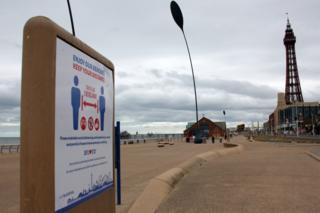
Hastings
The East Sussex town of Hastings has one of the lowest rates of confirmed Covid-19 infections in the country and its civic leaders are eager to keep it that way.
The message to visitors is simple: Hastings is closed.
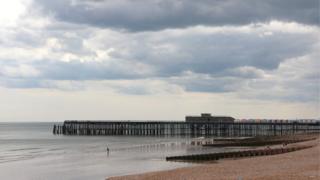
But there are other figures that are less heartening. New research shows one in four children lives in poverty and the government says Hastings is one of the most deprived areas in the country.
Tourism is a major employer, but with businesses closed, many are struggling to make ends meet.
 Image copyright NATALIE WILLIAMS
Image copyright NATALIE WILLIAMS Natalie Williams, who runs Hastings Foodbank, says demand has more than doubled compared to April last year.
«We are already seeing people who are out of work because of the coronavirus pandemic,» she says. «If we lose a summer here, it’s going to be devastating.»
The prospect of missing the holiday season revenue is «very concerning,» says Laurence Bell, owner of the White Rock Hotel, opposite Hastings Pier.
«You make your money in the summer, which then carries you through the winter,» he says.
You might also be interested in:
The effect of lockdown on Little America
‘I’m spending lockdown in Henry VIII’s palace’
‘They were fighting for a pack of chicken breasts’
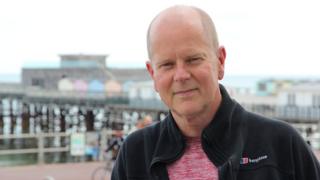
He supports the council’s «cautious approach,» but says that if the hotel is not able to open by the end of September, it will probably have to remain closed until the following spring.
The 40-odd employees currently supported by the government furlough scheme, which is due to end in October, would be made jobless.
«We fully intend to open again and get everyone back… we hope to do that, but there is no guarantee in life,» he says.
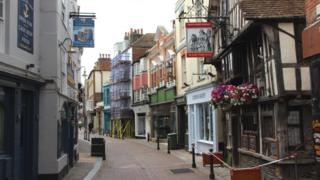
Continued growth in tourism, which brings in an estimated £266m annually and provides about 5,300 jobs, is central to overcoming the town’s «economic challenges», according to Hastings Borough Council.
Natalie Williams says London Road, running northwards from the seafront, provides a visual representation of some of the transformation that has happened in recent years – and some of the problems that still exist.
«To the left is Norman Road, you will see quirky restaurants and shops. It’s really lovely.
«If you look to the right, you will see boarded-up shops. You might see discarded needles and people asking you for change. It’s a real contrast.»

Tommy’s Pizzeria opened on the corner of London Road and Norman Road last year.
As a new business with many bills to pay, lockdown posed a risk they would get further into debt and «be in real trouble», says co-owner Mark Edwards.
But pizza deliveries and takeaway coffees, combined with a government grant and furlough for staff, have kept them afloat.
The clamour to restart the economy must be balanced against the risk of increasing the transmission of coronavirus, he says.
«It’s really important for the town that it does get open, if it can, for the summer. But, equally, a rush to make some money now and then being closed again in a month for the rest of the year would be much more damaging.»
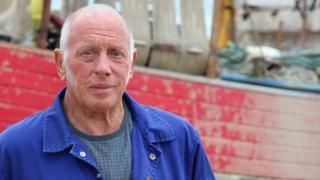
Fisherman Paul Joy and his crew have been battling a different «epidemic» for the past three years, he says.
An abundance of spider crabs, which tear through nets and are virtually worthless, had already hit fishermen’s income.
When restaurants closed across Europe, and much of the market for their catch disappeared overnight, they were forced to stay ashore for several weeks.
His ancestors have been launching fishing boats from the beach at The Stade since the time of the Norman Conquest. But where the fleet once numbered in the 40s, there are today just 15 vessels, employing about 100 people.
The boats have now returned to the water, albeit with the price of fish a long way from its peak, and the impact of the short lull was softened by government grants.
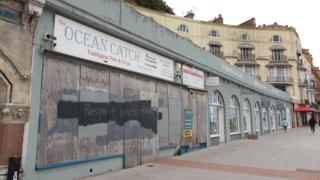
But redrawing fishing quotas after Brexit will be the key to steering the fleet back to prosperity, he says.
«In the long term, Covid is not going to be that important. It’s how we deal with the Common Fisheries Policy and the deals made within Europe.»
Council leader Kim Forward says the town’s approach to visitors will be reviewed each week.
«Our position is driven by putting residents’ safety first,» she says. «At the end of all of this, it will be impossible to know if we overreacted; if we were too cautious. But it will be obvious if we weren’t cautious enough.»
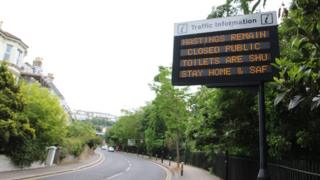
Photographs: Lauren Potts, Laurence Cawley, William McLennan. Subject to copyright.


